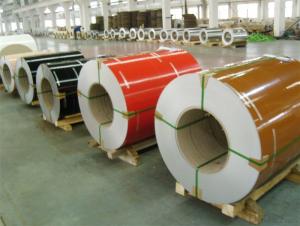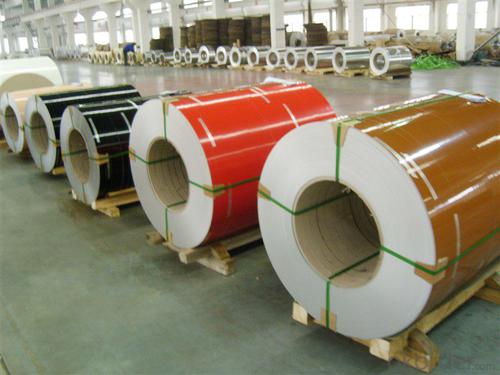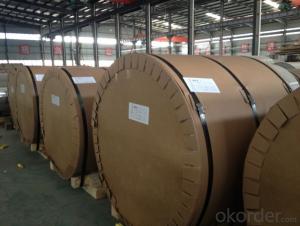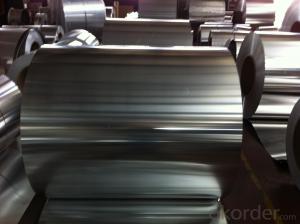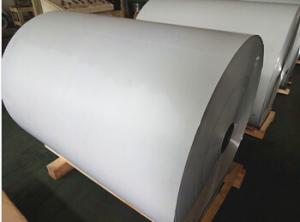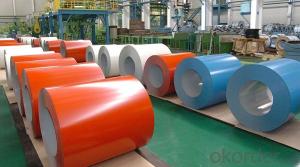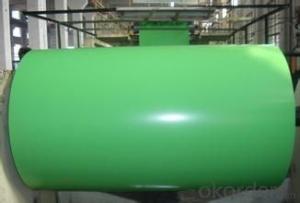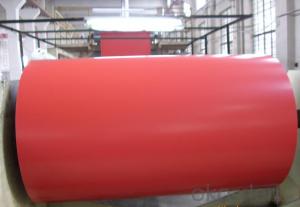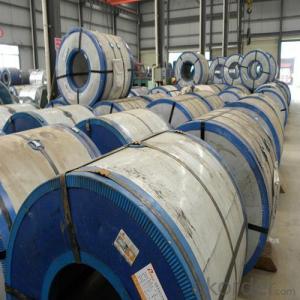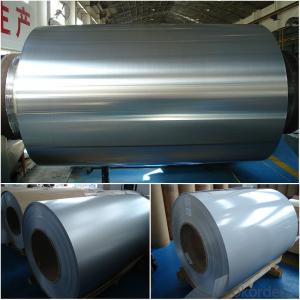Acm Aluminum Coil - Red Color Coating Aluminum Coil with High Quality
- Loading Port:
- Shanghai
- Payment Terms:
- TT OR LC
- Min Order Qty:
- 5 m.t.
- Supply Capability:
- 10000 m.t./month
OKorder Service Pledge
OKorder Financial Service
You Might Also Like
Specification
1. Specification of Red Color Coating Aluminum Coil with High Quality
Material | Alloy Aluminum 6063,6061,6005 or customer nominated |
Temper | T3, T4, T5, T6 |
Surface | Anodize, electrophoresis, powder coating, PVDF coating, wood grain painting, matted, etc. |
Colour | Any colour based on Standard Germany RAL Mark |
Length | Coating 6.5 meters, Anodizing 6.5 meters, Mill finish 5 meters |
Press Machine | 500-4000 tons all together 64 press lines. |
Fabrication | 1. Windows and doors; 2. Drilling; 3. Bending; 4. Cutting; 5. etc. |
Certificate | ISO 9001 |
Moulding | 1. Using our moulds, no fee; |
2. Using customer drawing, opening mould, usually about 10~50 tons then the moulding can be refunded. | |
3. Mould cost is negotiable base on the order quantity | |
Capability | Annual output 100,000 tons |
2. Application of Red Color Coating Aluminum Coil with High Quality
(1).Interior: wall cladding, ceilings, bathrooms, kitchens and balconies, shutters, doors...
(2).Exterior: wall cladding, facades, roofing, canopies, tunnels,column covers , renovations...
(3).Advertisement: display platforms, signboards, fascia, shop fronts...
3. Feature of Red Color Coating Aluminum Coil with High Quality
*Such coil is specially designed to replace aluminum ingot, due to the high export tax of aluminum ingot, the coil has better price than ingot.
*This type of coil can fit customer's remelting furnace just like ingot, no need to make any change to the production line that was previously used for ingot. The standard coil size and weight is very suitable for the feed gate of furnace.
*This type of coil causes less material wastage than ingot when remelted.
*Our coil is made directly from ore, no need to go though the ingot making process, quality is much better than other suppliers who use ingot scrap to make coil.
Be free from Oil Stain, Dent, Inclusion, Scratches, Stain, Oxide Dicoloration, Breaks, Corrosion, Roll Marks, Dirt Streaks and other defect which will interfere with use
4. Certificate:
SGS and ROHS(if client request, paid by client), MTC(plant provided), Certificate of Origin(FORM A, FORM E, CO), Bureau Veritas and SGS (if client request, paid by client), CIQS certificate
5. Image of Red Color Coating Aluminum Coil with High Quality
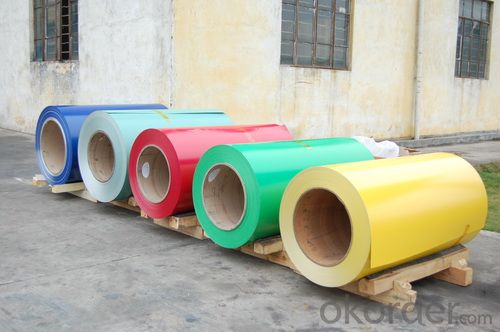
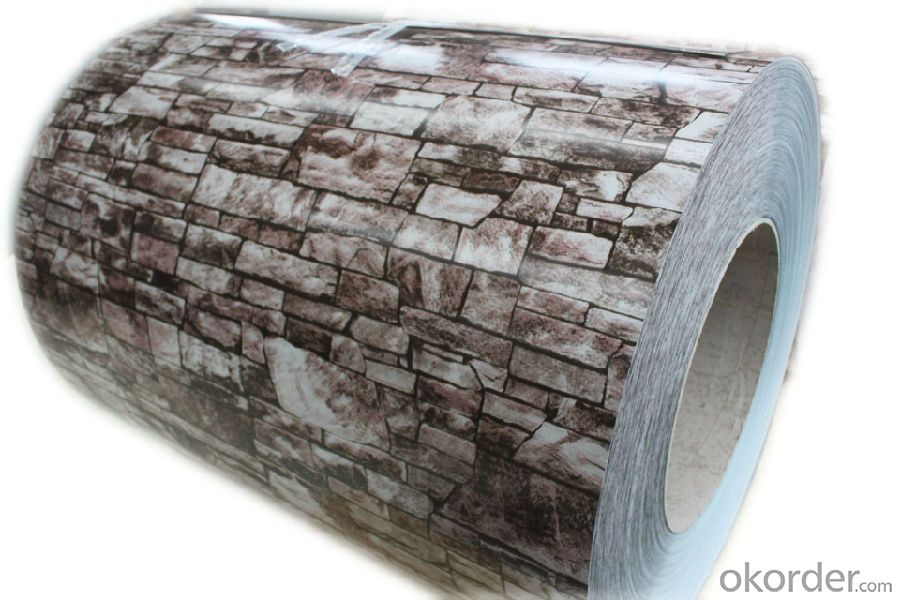
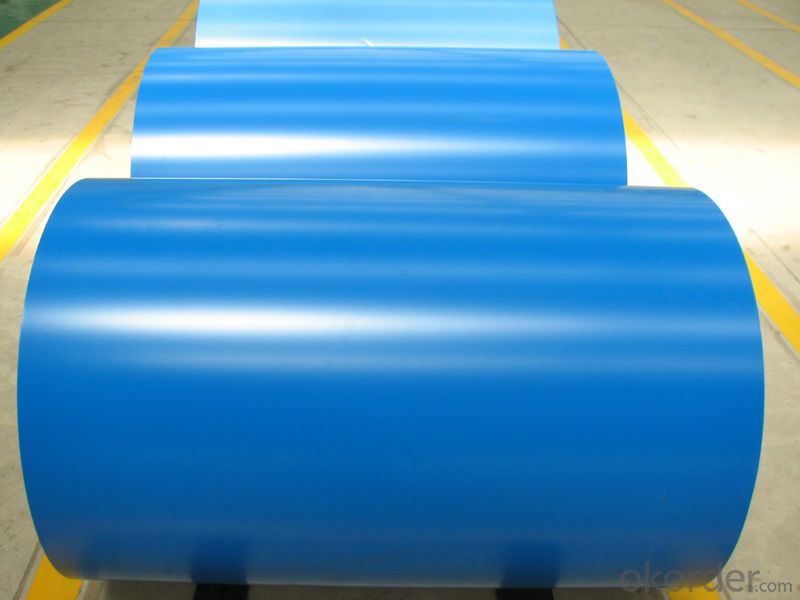
6. Package and shipping of Red Color Coating Aluminum Coil with High Quality
eye to wall
eye to the wall
with wood pallet (wooded case also available)
7. FAQ
1) What is the delivery time?
Dpends on actual order, around 20 to 35 days
2)What is the QC system:
We have QC staff of 20 persons and advanced equipment, each production is with MTC traced from Aluminum ingot lot.
3) What market do you mainly sell to?
Australia, America, Asia, Middle East, Western Europe, Africa etc
- Q: What are the different packaging weights available for aluminum coils?
- The available packaging weights for aluminum coils vary depending on specific requirements and applications. Aluminum coils can be packaged in a range of weights, typically measured in pounds or kilograms. The specific packaging weight depends on factors such as coil size, thickness, and the quantity needed by the customer or industry standards. For larger industrial applications, common packaging weights for aluminum coils can range from as low as 500 pounds (or 227 kilograms) to several thousand pounds (or several metric tons). These weights guarantee secure and efficient transportation and storage, as well as easy handling and loading. It is worth mentioning that the packaging weight of aluminum coils can be customized to meet specific needs. Manufacturers and suppliers often collaborate closely with customers to determine the most suitable packaging weight based on transportation requirements, storage space limitations, and industry regulations. In conclusion, the packaging weights for aluminum coils are flexible and can be personalized to meet individual needs, ensuring safe and convenient handling while satisfying the demands of different industries.
- Q: Can aluminum coils be used in the production of aluminum curtain walls?
- Yes, aluminum coils can be used in the production of aluminum curtain walls. Aluminum coils are often used as a raw material for manufacturing curtain walls due to their lightweight, durability, and excellent corrosion resistance. These coils can be easily shaped, cut, and formed into the desired profiles, making them ideal for constructing curtain walls that are commonly used in modern architecture.
- Q: Can aluminum coils be used in the production of signage?
- Yes, aluminum coils can be used in the production of signage. Aluminum is a popular material choice for signage due to its durability, lightweight nature, and resistance to corrosion. The coils can be easily shaped and formed into various sign types, including flat panels, channel letters, and more. Additionally, aluminum can be coated or painted to achieve different colors and finishes, making it a versatile option for signage production.
- Q: How are aluminum coils used in the production of electronic devices?
- Aluminum coils are used in the production of electronic devices for various purposes such as providing electrical conductivity, heat dissipation, and electromagnetic shielding. These coils are typically used in components like transformers, inductors, and motors, where they help in the efficient transfer of electrical energy. Additionally, aluminum coils are often employed in cooling systems to dissipate heat generated by electronic components, ensuring their optimal performance and preventing overheating. Furthermore, aluminum coils can be utilized to create electromagnetic shields that protect sensitive electronic circuits from external electromagnetic interference, thus enhancing the overall reliability and functionality of electronic devices.
- Q: Do aluminum coils require any special maintenance?
- Aluminum coils, like any other HVAC system components, do require regular maintenance to ensure optimal performance and longevity. While they may not require any specific special maintenance, they still need attention and care to function efficiently. Regular maintenance tasks for aluminum coils include cleaning, inspection, and occasional coil straightening. Cleaning the aluminum coils is crucial to remove dirt, dust, and debris that can accumulate on the surface over time. This buildup can restrict airflow and hinder heat transfer, reducing the overall efficiency of the system. Cleaning can be done using a soft brush or vacuum cleaner, ensuring that the fins and coils are not damaged in the process. Additionally, regular inspection of the aluminum coils is necessary to identify any signs of corrosion, leaks, or damage. Addressing these issues promptly can prevent further deterioration and costly repairs. It is recommended to check for any bent or damaged fins and straighten them if necessary to maintain proper airflow. Furthermore, it is essential to keep the surrounding area free from debris or vegetation that could obstruct airflow and cause the coils to work harder, leading to increased energy consumption and potential compressor damage. Regularly trimming vegetation and keeping the area clean will help maintain the coils' performance. Lastly, it is advisable to have a professional HVAC technician perform annual maintenance on your HVAC system, including the aluminum coils. They can conduct a more thorough inspection, clean the coils with specialized equipment, check refrigerant levels, and ensure the system is operating at its best. In conclusion, while aluminum coils do not require any specific special maintenance, regular cleaning, inspection, and occasional coil straightening are essential to ensure their optimal performance, prevent damage, and extend their lifespan.
- Q: What are the weight and length specifications of aluminum coils?
- Depending on the specific type and purpose of the coil, aluminum coils can have varying weight and length specifications. Typically, the weight of aluminum coils can range from a few hundred pounds to several thousand pounds, while their length commonly varies from a few hundred feet to several thousand feet. Nevertheless, it should be emphasized that these specifications can be tailored to meet the specific requirements of the intended application or industry.
- Q: What are the potential applications of mill-finished aluminum coils?
- Due to their versatile properties and finishes, mill-finished aluminum coils can be applied in a wide range of industries. Here are some potential uses for mill-finished aluminum coils: 1. In the building and construction industry, mill-finished aluminum coils have numerous applications. They can be employed for roofing, siding, wall cladding, gutters, and downspouts, among other purposes. The mill finish not only enhances the building's aesthetic appeal but also ensures durability and resistance to corrosion. 2. The automotive industry also utilizes mill-finished aluminum coils because of their lightweight nature, high strength-to-weight ratio, and resistance to corrosion. These coils can be used to manufacture body panels, trims, and other components, contributing to fuel efficiency and reducing the overall weight of vehicles. 3. The electrical industry benefits from mill-finished aluminum coils due to their electrical conductivity and corrosion resistance. These coils are employed in the manufacturing of electrical enclosures, transformers, busbars, and conductors. The mill finish guarantees high-quality surface finishes for these electrical components. 4. The packaging industry widely employs mill-finished aluminum coils because of their excellent barrier properties and formability. They are used to manufacture aluminum foil, cans, lids, and other packaging materials. The mill finish provides a smooth surface, making it suitable for printing and branding purposes. 5. Mill-finished aluminum coils are also used in the manufacturing of household appliances like refrigerators, ovens, and air conditioners. These coils offer lightweight and corrosion-resistant solutions for these appliances, ensuring durability and energy efficiency. 6. In the aerospace industry, mill-finished aluminum coils find applications due to their lightweight nature and high strength. They can be utilized to manufacture aircraft structures, interior components, and other parts. The mill finish provides a smooth surface, enhancing aerodynamic efficiency and reducing drag. 7. The marine industry extensively uses mill-finished aluminum coils for various applications. They are employed in the manufacturing of boat hulls, decks, and other components due to their corrosion resistance and lightweight properties. The mill finish ensures a clean and polished appearance, enhancing the vessel's aesthetics. In conclusion, mill-finished aluminum coils possess versatile properties such as lightweight, corrosion resistance, formability, and aesthetic appeal, making them suitable for numerous potential applications across various industries.
- Q: What are the different thicknesses available for aluminum coils?
- To meet different application needs, aluminum coils come in various thicknesses. The available options typically span from 0.2mm to 6mm. The thickness required depends on the intended use of the coil. For applications that prioritize flexibility and lightweight properties, thinner coils ranging from 0.2mm to 1mm are commonly used in electronics, packaging, and building materials. Medium thickness coils, ranging from 1mm to 3mm, find frequent use in automotive parts, roofing, and cladding applications. Conversely, heavier-duty industrial applications like shipbuilding, aerospace, and construction utilize thicker aluminum coils, measuring 3mm to 6mm in thickness. To determine the most suitable thickness for a given application, it is crucial to consider the specific requirements and intended use of the aluminum coil.
- Q: I want to know when it comes to racing which is better? I have a 24 inch aluminium bmx frame and want to know if chromoly frames are faster? Also before buying parts for my bike should I go all aluminum like the bars and forks? Also which is faster the aluminum or the chromoly frame?
- There are no 24 inch BMX frames.
- Q: I heard that one pound of aluminum pop tabs are worth more then a pound of aluminum pop cans. Is this true? Thank you.
- The pop tabs do not have the plastic, or the paint, just pure aluminum. ~Garnet Permaculture homesteading/farming over 20 years
Send your message to us
Acm Aluminum Coil - Red Color Coating Aluminum Coil with High Quality
- Loading Port:
- Shanghai
- Payment Terms:
- TT OR LC
- Min Order Qty:
- 5 m.t.
- Supply Capability:
- 10000 m.t./month
OKorder Service Pledge
OKorder Financial Service
Similar products
Hot products
Hot Searches
Related keywords
